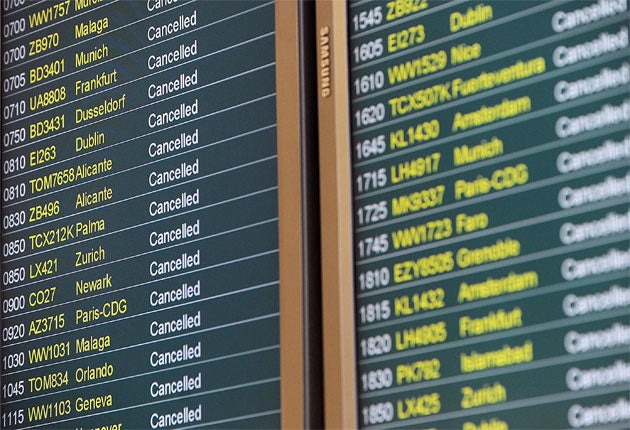Volcano crisis cost airlines more than £2bn

European states can bail out airlines struggling to bounce back from the no-fly zone earlier this month, Brussels said yesterday, as it warned the shutdown could cost more than £2bn.
Relaxing strict rules banning state subsidies, European Transport Commissioner Siim Kallas indicated governments would be allowed to carry out a range of measures such as temporarily lifting rules on night flights, deferring air traffic control fees and providing soft loans.
However, he warned that the European Commission's offer to turn a blind eye to state help should not be used as an excuse to prop up failing carriers or help them through immediate cash flow problems.
"This must be granted on the basis of uniform criteria established at the European level," Mr Kallas said. "It cannot be used to allow unfair assistance to companies which is not directly related to the crisis." He also called for "coordinated action" to ensure all airlines followed EU laws on the treatment of delayed passengers, after some carriers announced their intention to limit refunds in contravention of the legislation.
He said that the Commission had calculated the cost of the crisis this month, when air traffic controllers across Europe grounded flights for up to six days because of concerns that a cloud of ash from an Icelandic volcano could damage jet engines. "We have taken all assessments and valuations of costs from all the different stakeholders and we are working with a number between €1.5bn and €2.5bn (£1.3bn and £2.2bn)," Mr Kallis said.
The estimate covers all sectors of the aviation industry, including airlines, airports, tour operators and ground handlers, hit by the cancellation of around 100,000 flights which left 10 million travellers stranded in Europe. An estimated 200,000 British people were stranded abroad.
As airlines continued to lay on extra flights to fly passengers home, the Association of British Travel Agents (Abta) estimated around 35,000 Britons were still stuck at airports around the world. "The majority of people are expected to be back by the end of the week," said an Abta spokeswoman.
As the fall-out from the crisis has continued, British Airways and other recession-hit airlines have continued to call for compensation for the long shutdown, which they claimed was an overreaction. Backing that call to some degree yesterday, Mr Kallas said member states would be allowed "to make good damage caused by natural disasters or exceptional occurrences".
He also said that the EU had called an emergency meeting of transport ministers next week to fast-track the "European single skies" project, which is intended to merge the separate areas of national air space.
The plan is to create nine air spaces instead of the current 27 by 2012, but there could be a single air space in the long term, Mr Kallas said.
Calling for a "single European regulator for a single European sky", Mr Kallis said that unifying air space would stop decisions being made by dozens of individual countries – one of the key sources of confusion in the volcanic ash crisis. He added: "This would have enabled a much more agile response."
He explained that the first priority of the European Union had been to ensure passengers were well treated. "Now, as we are getting back to normal, our focus can shift to relief measures for the industry. The Commission is also proposing structural changes to ensure we do not face this situation again," he said.
A spokesperson for the Department for Transport said that it would not take "unilateral action" to help airlines but was discussing the available options with the commission. "A meeting of European transport ministers is scheduled for next week and we await the outcome of those discussions," it said in a statement.
Airlines claimed to be losing up to £20m each a day during the crisis, with more than 100,000 cancelled flights.
Andy Harrison, the chief executive of budget airline easyJet, welcomed the relaxation of subsidy rules. "The Commission acknowledges that the five-day closure of European air space was a result of the forces of nature and, like all natural disasters, only governments have the resources to deal with the consequences," he said.
"We hope that the response from governments to compensate airlines will be speedier than their response to the volcanic eruption. Governments also need to ensure that this doesn't become an excuse to subsidise weak airlines."
Join our commenting forum
Join thought-provoking conversations, follow other Independent readers and see their replies
Comments
Bookmark popover
Removed from bookmarks